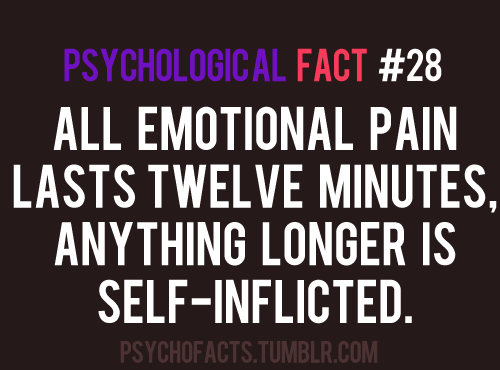sassafras
...
- MBTI
- .
Note: Please read entire post before responding.
I've seen this floating around lately and I thought I might bring it to your attention:

I don't know what the whole 12 minutes thing is about, since I haven't been able to find any article or source to support the claim (really, it does sound like somebody just randomly pulled that time-frame out of their ass) but it does raise some interesting questions.
Where does raw emotional pain end and where do our own unique psychologies exacerbate on the reaction? Is it ever an exacerbation? Does true emotional pain exist without the trappings of individual psychology? What decides our capacity for and vulnerability to the effects of emotional pain? What are your reactions to this poster?
Barring the whimsy twelve-minute claim, do you agree or disagree with this statement?
Discuss!
I've seen this floating around lately and I thought I might bring it to your attention:

I don't know what the whole 12 minutes thing is about, since I haven't been able to find any article or source to support the claim (really, it does sound like somebody just randomly pulled that time-frame out of their ass) but it does raise some interesting questions.
Where does raw emotional pain end and where do our own unique psychologies exacerbate on the reaction? Is it ever an exacerbation? Does true emotional pain exist without the trappings of individual psychology? What decides our capacity for and vulnerability to the effects of emotional pain? What are your reactions to this poster?
Barring the whimsy twelve-minute claim, do you agree or disagree with this statement?
Discuss!
Last edited:
